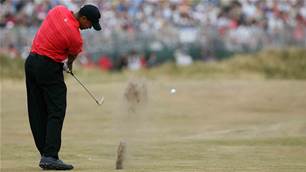Imagine stepping up to a golf shot knowing the outcome is completely judgment-free—that your worth is not riding on the result. Your only job is to express yourself—to swing freely, play creatively, and enjoy the process. That’s how Scottie Scheffler plays. And that’s something any golfer can learn from.
With his runaway win in the Open Championship, which follows runaway wins in the U.S PGA Championship and Memorial Tournament, capping an extraordinary stretch of dominance over the past few years, Scottie Scheffler has firmly established himself as the best golfer on the planet.
His calm presence and consistent excellence have drawn comparisons to Tiger Woods in his prime. But beneath the composed exterior lies a deeper story – one that reveals the true source of Scheffler’s strength.
On the Sunday morning before his first Masters victory, Scheffler was curled up in a ball on the kitchen floor, overwhelmed with nerves and self-doubt. Despite leading the tournament, he questioned whether he had the emotional capacity to withstand the pressure and close out the win. His ability to rise from that vulnerable moment wasn’t just a matter of skill – it came down to something much deeper: knowing who he is.
Scheffler’s faith is a central pillar of his identity. He’s a man of God. He’s also a husband, a father, a son and a friend – only one part of that whole is “golfer”.
His wife reminded him of that truth in a powerful moment of clarity: this tournament doesn’t define you. Winning or losing doesn’t change your value.
That reset allowed Scottie to reframe the pressure, detach his worth from the outcome and step onto the course clear of mind and at peace.
What makes Scheffler truly extraordinary is his intentionality. He’s intentional in his strategies, his preparation and most importantly, in how he lives his life. That intentionality flows from his identity – he knows who he is and whose he is. Because of that, his golf game is an extension of himself, not a performance to prove his value.
His actions align with his inner truth, freeing him to express his gifts without fear of judgment or condemnation. He plays with joy, not pressure. While others tie their self-worth to scorecards, Scheffler transcends that trap. Yes, he still faces pressure – every great athlete does – but he’s no longer shackled by the need to be validated by outcomes. That’s a rare and powerful kind of freedom.
Anxiety in golf often stems from projecting past failures into the future – fearing what might happen instead of focusing on what you want to happen. But anxiety is not fear; fear is based on real and present danger. Anxiety is imagining a negative outcome that may never occur. The antidote? Intention. Set a clear intention for your shot, visualise it, trust your preparation and then surrender the outcome.
Every golf shot is unique. Different lie, different wind, different situation. You’ve never hit that exact shot before. Accept the uncertainty. Embrace it. Then trust your fundamentals – your grip, alignment, posture, tempo – and swing. Be curious about the result rather than anxious about it.
Scheffler reminds us that the mental game isn’t about eliminating pressure – it’s about rising above the kind that doesn’t belong.
And take from Scheffler's example this: align your identity with truth; be intentional with your thoughts and actions; and trust that freedom, not fear, produces your best golf.
Because the game is far more enjoyable when it’s played from a place of peace, purpose and presence.
Related Articles

Course Management tips with mindset coach Chris Hynes

Aussies solid as Rory rises and Scheffler has a shocker















